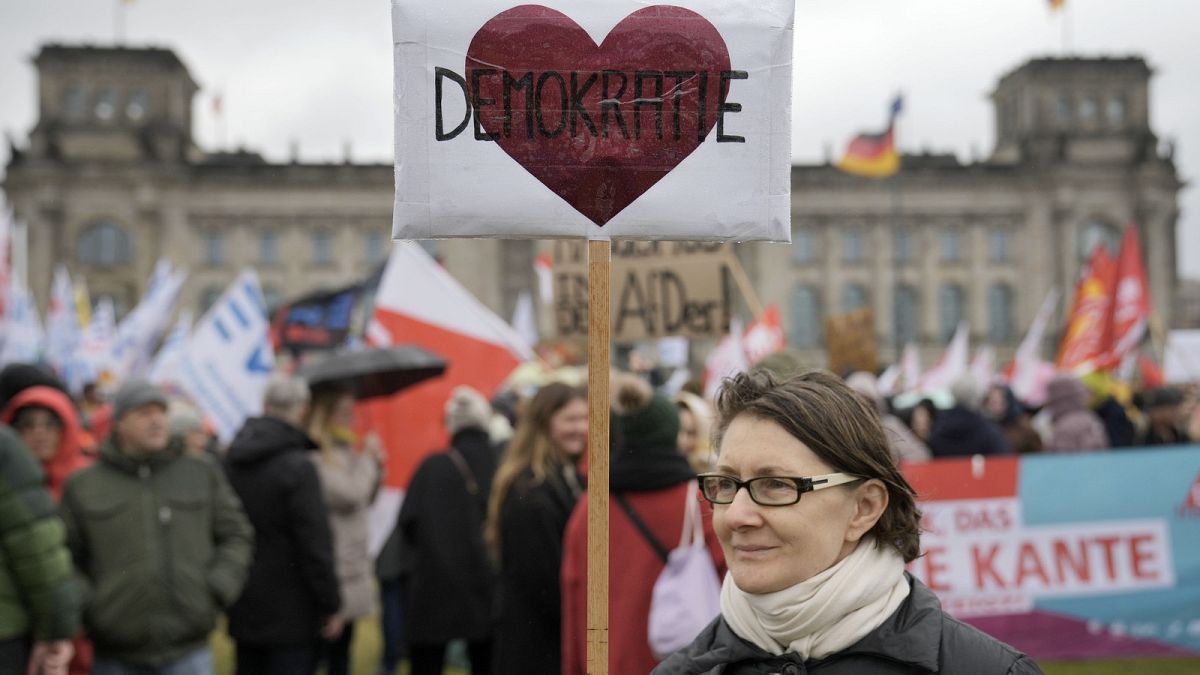Dissatisfaction with democracy brewing in Europe, global study finds

In a slim majority of the EU countries surveyed (eight out of 15), improving healthcare emerged as the number-one priority. Tackling poverty is also seen as a high concern in several countries, topping the list in four of the 15 member states surveyed.
A new global study has found that dissatisfaction with democracy is deepening in parts of Europe, where governments are not living up to the democratic expectations of their citizens.
The Democracy Perception Index (DPI) is the biggest global temperature test of democracy, with almost 63,000 people from 53 countries, including 15 members of the European Union, surveyed between February and April this year.
While a majority of EU citizens (57%) consider their home countries to be democratic, in three member states – France, Greece and Hungary – a majority now think they no longer live in free democracies.
In Hungary, only 31% of citizens consider their country a democracy. In recent years, the country has been caught in the crossfire with Brussels over democratic backsliding and rule of law violations, including anti-LGBT legislation, the stifling of independent media, widespread cronyism and political interference in the judiciary.
Dissatisfaction is also on the rise among Greeks, only 43% of whom think their country is democratic.
Greece, the birthplace of democracy, has recently come under scrutiny over allegations of illegal migrant pushbacks in the Mediterranean Sea, the erosion of media freedom and a sprawling spyware investigation involving journalists and opponents.
Earlier this year, the European Parliament adopted its first-ever resolution on the rule of law in Greece, decrying its continued regression and calling for a review of EU funds.
In France, almost half of respondents (46%) feel their country is democratic. Economic turmoil, outrage over President Emmanuel Macron’s pension reforms, and increasing mistrust in the ruling class have caused the country’s democratic perception to plummet.
In other European countries, such as Germany, there is a widening gap between how important people say democracy is and how democratic they think their country is, also known as the Perceived Democratic Deficit (PDD).
This deficit stands at a staggering 51% in Greece and 50% in Hungary. It has also increased by a significant 9% in Germany since 2023, where it now stands at 36%.
The impression that governments often act in the interest of a minority group rather than for the common good has also increased on average across Europe since 2020, with a sharp increase seen in Germany, from 34% in 2020 to 54% in 2024.
The eye-catching 20% jump illustrates the brewing dissatisfaction with socialist Chancellor Olaf Scholz’s three-way governing coalition with the Greens and Liberals, sworn in in 2021. His coalition partners have been at loggerheads over a range of policy issues, from the budget to childcare allowances and economic policy, fuelling frustration and causing his socialist SPD party to fall in the polls.
Migration a rising concern
The Democracy Perception Index (DPI) also provides insights into what people want their elected governments to focus on.
In a slim majority of the EU countries surveyed (eight out of 15), improving healthcare emerged as the number-one priority.
Tackling poverty is also seen as a high concern in several countries, topping the list in four of the 15 member states surveyed.
Over the past two years, there has also been a sharp rise in the share of people who say that “reducing immigration” should be a top government priority. This trend is particularly salient in Austria, Germany, Ireland and France, where immigration has jolted up respondents’ priority lists in recent years.
Reducing immigration should be among their governments’ top three priorities, according to 44% of Germans, 40% of Austrians, 37% of French and 31% of Irish respondents.
Germany is the world leader in terms of the highest share of people who want their government to focus on reducing immigration (44%), topping all other priorities. On the other hand, climate change is slipping down the priority list amongst Germans, only 24% of whom see it as a top three priority.
Fringe parties campaigning on a hard line on migration are creeping up in the polls ahead of June’s crunch European elections. Populist parties campaigning on a strong anti-migration agenda are set to win those elections in at least seven EU member states, and come second or third in a further nine.
A recent study suggests the friction between two tribes of voters, one mostly worried about climate change and the other about immigration, could shape the outcome of June’s European elections.
Global trust in the EU stagnates
While there is still a net positive perception of the EU in all the global countries surveyed, with the exception of Russia, that positive image is somewhat stagnating across the globe, as it is for the US and the UN.
The US is also facing something of a perception crisis, including in various EU countries.
Perception of the US is now net negative in Austria (-22%), Ireland (-5%), Germany (-4%), Belgium (-4%) and Greece (-4%).
Despite its ongoing invasion of Ukraine, the perception of Russia has continued to rise steeply on average across the globe since 2022.
Related
A New Book Argues That What Happens in Europe Doesn’t…
Remaking the World: European Distinctiveness and the Transformation of Politics, Culture, and the Economy by Jerrold Seigel “No issue in world
Poland plans military training for every adult male amid growing…
Poland’s prime minister, Donald Tusk, has said his government is working on a plan to prepare large-scale military training for every adult male in response t
2025 European Athletics Indoor Championships: Ditaji Kambundji secures women’s 60m…
Switzerland’s Ditaji Kambundji walked away from the 2025 European Athletics Indoor Championships in Apeldoorn on 7 March with much more than her first Europea
Takeaways from the EU’s landmark security summit after Trump said…
BRUSSELS (AP) — European Union leaders are trumpeting their endorsement of a plan to free up hundreds of billions of








